- About Us
- Columns
- Letters
- Cartoons
- The Udder Limits
- Archives
- Ezy Reading Archive
- 2024 Cud Archives
- 2023 Cud Archives
- 2022 Cud Archives
- 2021 Cud Archives
- 2020 Cud Archives
- 2015-2019
- 2010-2014
- 2004-2009
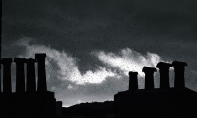 |
Cud Short Fiction: |
We were partying… somewhere. It felt like New Years, but we were in a small place, and didn't seem to be going too hard at it- perhaps not Hogmanay but one of those dead days between Christmas and New Year when everyone's free and there's not much else to do. I felt like I knew the town and had been there a few times before, but it wasn't home. I was hammered, as usual. It certainly seemed to be usual as no-one even took the piss out of me as I woke up confused and carrying on with a whole 'Where am I, who am I?' routine. My friends were leaving to move on and I was having real trouble finding my shoes and jacket despite the fact they were already on me. Then I panicked over money that was missing from my pocket along with my wallet itself, which, after some more stumbling and running back in my head as to when I'd last seen it I finally found in exactly the first place I'd looked.
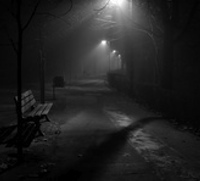 We left, heading toward another party and another friend's house. It was snowy outside but not too cold. The snow had obviously been slushy where people had walked during the afternoon and was just beginning to crisp with frost. I ran ahead, brought sharply awake by the nippy air, and tried to jump and slide on the ice and slush. True to form my friends took advantage to pelt me with snowballs, big fat white ones, apart from Pasty who had chosen to throw his usual lethal balls of barehanded ice. I laughed back at them, dancing and failing to avoid the deluge, looking up over the square we had arrived in, not far from the house we'd just left. Not a large area- and just another anonymous Scottish town 'square'. On the right and behind was a large church-like building, incongruous brick walls set against the general stone, slightly foreboding. To our right along the road was a row of two-storey houses. Ahead and to our left sat some low warehouse-style buildings with gable ends that faced the square.
We left, heading toward another party and another friend's house. It was snowy outside but not too cold. The snow had obviously been slushy where people had walked during the afternoon and was just beginning to crisp with frost. I ran ahead, brought sharply awake by the nippy air, and tried to jump and slide on the ice and slush. True to form my friends took advantage to pelt me with snowballs, big fat white ones, apart from Pasty who had chosen to throw his usual lethal balls of barehanded ice. I laughed back at them, dancing and failing to avoid the deluge, looking up over the square we had arrived in, not far from the house we'd just left. Not a large area- and just another anonymous Scottish town 'square'. On the right and behind was a large church-like building, incongruous brick walls set against the general stone, slightly foreboding. To our right along the road was a row of two-storey houses. Ahead and to our left sat some low warehouse-style buildings with gable ends that faced the square.
It was then I realised something was wrong. Above the warehouse roofs stood a mass of grey cloud, twisting strangely in odd winds that didn't seem to reach the square. 'Stood' was wrong but the cloud appeared to be stalking us, almost with purpose, but only our general direction. The top of the cloud spread across the sky, yet at the base it came down too low, an inverted slate mass concentrated from the hanging cloud base. Comforted by my nice warm party glow the worst I could imagine from this cloud was serious snow - although the wind was too light to justify what looked like a supreme blizzard. Perhaps hail? Whatever. I shouted behind to the group, pointed, and started to run to the buildings ahead. There was a deep doorway in the far right warehouse wall, and I headed for it, keeping as much of an eye on this twisted cloud as I could. It continued to stalk unnaturally toward us, too fast, and now with a hint of direction to the movement. The base put down feelers, almost like legs, touching here and there on rooftops, obscuring them individually before the rest of the grey caught up and obscured the whole roofline. I glance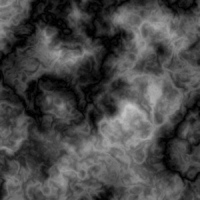 d back at my friends strung out across the square, each beginning to show signs of urgency if not understanding. Some -Rob, Ros and Blondie- made for my doorway, while others peeled off for shelter in others across the square.
d back at my friends strung out across the square, each beginning to show signs of urgency if not understanding. Some -Rob, Ros and Blondie- made for my doorway, while others peeled off for shelter in others across the square.
The whole atmosphere became oppressive, turgid; movement was manageable but vision and sound were distorted. I noted the silver grey of the aged wood of the door, the grey of the stone, the flecks of flaking ancient green paint, and the round doorknob. Rob and I looked back and saw a massive, roiling cloud break that was like nothing we’d ever seen drift over the roofline of the square. It was like a suspension of satanic graphite, and looked like every sandstorm, volcanic ash flow and portal to Hell I’d seen in the movies. It was beyond belief. It stormed overhead then surged down, reaching for but not touching the ground. Small fingers and wisps plucked from the cloud at Blondie and Ros as they tried to join us. I sobered up fast. Until then the worst I’d imagined could emanate from this cloud was some football-sized hail, maybe a few scrapes and bruises and a good story, but this was malevolent, something aware and hunting for us. Without thought I grabbed the door handle and burst through into the space beyond. In a flash I registered an old grey woman cleaning a frayed and worn carpet in front of a frayed and worn sofa, while beyond down the length of the space sat long trestle tables draped with daringly colourful artworks, canvases without frames, bright to my eyes after the grey outside. With a howl a wind came from the depths of the cloud, screaming banshee, boggart, balrog, sucking out all other noise and breath with it. I spun to the door where Ros was holding Blondie as more feelers came forth from the cloud. They we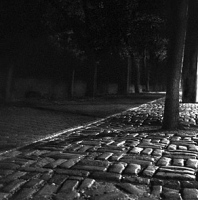 re thin at first, questing fingers of mercurial hatred plucking at her woolen jumper. Then she was suddenly taken, snatched into the square by an unseen force. Through the doorway we watched balls of fist-sized fire hammering down like first warning drops of monsoon rain. Fire ran through the feelers around Blondie, illuminating a face wracked with confusion before the cloud touched ground around her. The confusion turned for a brief instant to horror before she disappeared into a mix of midnight blue and fire, winds ripping through and around her, she was tugged, lifted and torn and any scream she had was stolen by whatever fury now had her.
re thin at first, questing fingers of mercurial hatred plucking at her woolen jumper. Then she was suddenly taken, snatched into the square by an unseen force. Through the doorway we watched balls of fist-sized fire hammering down like first warning drops of monsoon rain. Fire ran through the feelers around Blondie, illuminating a face wracked with confusion before the cloud touched ground around her. The confusion turned for a brief instant to horror before she disappeared into a mix of midnight blue and fire, winds ripping through and around her, she was tugged, lifted and torn and any scream she had was stolen by whatever fury now had her.
Our fears soon turned to the fire. The stone building kept winds and the cloud at bay, furious though they were, but the slates of the roof had been transformed into rattling, wild daggers in the storm, and we had nothing but creaking boards between us and a sky full of falling flame. Already areas were ablaze, the fire so red against the dark sky that it actually burnt with a paler blue flame. We watched paralysed as trickles spread along joints in the old wood, defining each plank. The old grey woman seemed confused at the speed of all that was happening around her, this intrusion and confusion. Ros spoke to her, held her arms and screamed for help and she was able to point us towards some buckets of water, one in the room with us, and others that lay past the artworks at the far end opposite. I grabbed the nearest one and emptied it at the roof, extinguishing a small blaze, half full of fear that I would seal our fate as the water sent the fire darting in every direction, but it extinguished it easily. It was a manic scene as we danced and dodged dripping liquid fire, filling our smaller buckets from large barrels at the end of the warehouse, flinging their grey so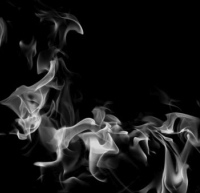 apy contents at every trace of flame we could see. At first we dealt only with the most ferocious orange flames and the worst burnt sections of the structure, sections of which occasionally had holes charred through the wood that allowed glimpses of the outside storm overhead. Gradually we fought only with blue flames, runnels of still flaming naphtha, burning in some cases almost invisibly along joins and pooled against joists and beams and in corners. I recall it was perhaps Rob who, despite the previous soakings, tried to avoid letting his last bucket or so drip from the roof to the artworks laid out underneath, charred soot marks and fallen embers already on them. The grey woman told us ‘not to worry, not to worry’, ‘fine job, fine job’, and I realised that I'd been hearing her throughout the ordeal, unable to keep up with the pace of our dashing to and fro, but encouraging and cajoling, even pointing out for the occasional flame we'd missed. As I carefully checked each last dark corner for near unseen flames I caught view of stars through the sodden black edged holes in the boards above. The quiet was suddenly immense, the storm had gone- nothing of that fury could remain so silent.
apy contents at every trace of flame we could see. At first we dealt only with the most ferocious orange flames and the worst burnt sections of the structure, sections of which occasionally had holes charred through the wood that allowed glimpses of the outside storm overhead. Gradually we fought only with blue flames, runnels of still flaming naphtha, burning in some cases almost invisibly along joins and pooled against joists and beams and in corners. I recall it was perhaps Rob who, despite the previous soakings, tried to avoid letting his last bucket or so drip from the roof to the artworks laid out underneath, charred soot marks and fallen embers already on them. The grey woman told us ‘not to worry, not to worry’, ‘fine job, fine job’, and I realised that I'd been hearing her throughout the ordeal, unable to keep up with the pace of our dashing to and fro, but encouraging and cajoling, even pointing out for the occasional flame we'd missed. As I carefully checked each last dark corner for near unseen flames I caught view of stars through the sodden black edged holes in the boards above. The quiet was suddenly immense, the storm had gone- nothing of that fury could remain so silent.
We opened the door to destruction. The houses along the street we’d traversed were now battered, windows blown in, doors unhinged, and in a few places the ridges of roofs showed in upper windows where they had collapsed among charred joists. Slates scattered the square, broken, sprinkled in and on the snow that remained between melt spots and other blown debris. The church building on the far side of the s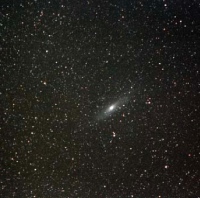 quare had been reduced to two ruined walls and a heap of rubble, as if a giant fist had hammered through the centre. An end wall spilled a few more bricks into the pile of broken beams and mortar beneath, the rattle eerily loud in the still square. Overhead frosty stars shone, marching clear across the sky, the threat, even that of snow, gone; wiped clean.
quare had been reduced to two ruined walls and a heap of rubble, as if a giant fist had hammered through the centre. An end wall spilled a few more bricks into the pile of broken beams and mortar beneath, the rattle eerily loud in the still square. Overhead frosty stars shone, marching clear across the sky, the threat, even that of snow, gone; wiped clean.
Afterward, no-one could find Blondie. We didn’t quite know how many had left the party with us or where they had gone. It had felt like we had just been witness to a fire of the Gods, and yet the destruction was not total. The power and fear we’d seen had been immense, but whether it was some sort of satanic hatred, divine retribution, pure unfocused alien or natural rage at something other than us, or whether Blondie had been a sacrifice, chosen over others who had been faster on their feet was never to be known. Whatever the source and cause, I will never, ever, forget the look of abject terror, of base primal fear, on Blondie's face in that one brief glimpse as the fires fell and the tornado tore her from the ground. That memory will remain forever etched in my mind as her tribute.
John Burton earns his money flying yellow submarines in the South China Sea. During breaks he manages to travel, write, and not play enough saxophone.
